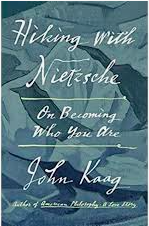John Kaag's Hiking with Nietzsche
Every one in a while, one comes upon a book that changes one’s life. Reading Proust a few years ago was one such experience for me. And earlier this year I had another, one that came from what at first glance seemed like a very unlikely source. When the world turned upside down with the pandemic back in March, I wasn’t able to read or write. The idea of fiction—reading it, writing it—seemed impossible. Fiction, I suddenly understood, belonged to the realm of leisure. So when we went into lockdown, and panic and uncertainty reigned, who could afford such leisure? Every book I turned to and tried to read (I had to do something in the evenings) seemed so utterly irrelevant, dissatisfying, even frivolous. So I turned to a book of non-fiction that had been sitting in my “to-read” pile, a book I’d ordered in 2018 after reading a good review of it in The Atlantic but never got beyond cracking back the cover: John Kaag’s Hiking with Nietzsche: On Becoming Who You Are.
Not only was I able to suddenly focus on something, but the book was the exactly what I needed. In times of uncertainty, worry, and fear, it offered what I (and probably all of us) really need: philosophy—a window onto the world. I don’t want to go into the particulars of Kaag’s book here and now (after all, I’d read it eight months ago), except to say that it’s one of a number of books in a sub-genre that have become popular in recent years, that is to say that book is part-memoir and part-philosophy primer. The greater effect the book had on me was that it launched me onto a different path—a new and exciting path—as far as my reading life goes. Kaag’s book introduced me not only to the ideas of Nietzsche but also to the work of Hermann Hesse, who was hugely influenced by Nietzsche, and I’ve since gone on to read five of his novels: Demian (which I adored), Steppenwolf, Beneath the Wheel, Siddhartha, and Narziss and Goldmund. Kaag also got me interested in the Existentialists, whose philosophy was also indebted to Nietzsche, and I soon read Camus’ The Plague (very apt pandemic reading) and his most famous novel The Outsider (L’Éstranger), and Gordan Marino’s own part-memoir, part-philosophy primer: The Existentialist’s Survival Guide. But as I said, Kaag’s book got me interested in the work of Nietzsche. I’ve since gone on to read Thus Spoke Zarathustra and I recently finished Walter Kaufmann’s seminal exegesis: Nietzsche: Philosopher, Psychologist, Antichrist. Walter Kauffman, I’ve since learned, is largely responsible for rescuing Nietzsche from obscurity after the Nazis appropriated and deliberately misinterpreted his philosophy for their own purposes, and pretty much any English translation of Nietzsche that you’ll come across will likely have been translated by Kaufmann. After finishing his tome-like study, I once again found myself in a position of being unable to concentrate on fiction, and right now I’m reading Nietzsche’s follow-up to Zarathustra: Beyond Good and Evil—and it’s very, very good.
I’ve often wanted to sit down and write something here in response to what I’ve been reading, but apart from the usual time constraints I also didn’t know where to begin or how to sum up these enormous ideas. And yet at the same time I’m also bursting with ideas. All I can really say for now is that these books—and Nietzsche in particular—have opened up a window for me, a way of seeing the world and making sense of it. And like I said above, it made me realize that maybe what we all need right now—especially in a world in which science and technology have largely supplanted religious faith (Nietzsche’s famous proclamation, “God is dead”)—is a little philosophy.
